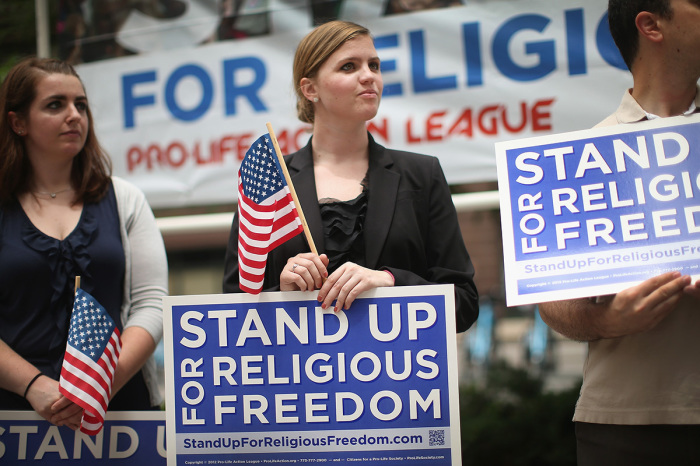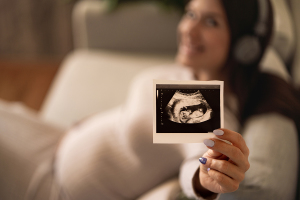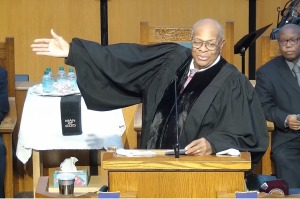Most Americans support parental opt-out of objectionable public school teachings: poll

About two-thirds of Americans agree with the notion that parents should be able to opt their kids out of public school teachings they believe are inappropriate or contradictory to their values as Americans' support for religious freedom reaches a record high, a new study suggests.
The Becket Fund for Religious Liberty released its fifth annual Religious Freedom Index Tuesday, which sampled the opinions of 1,000 American adults in an online survey conducted from Sept. 28 to Oct. 5, 2023. The poll has an error margin of +/-3.1 percentage points.
Released on National Religious Freedom Day, the report documents respondents' views about six dimensions related to religious freedom and assigns each of them a score on a 100-point scale based on the public's level of support. A score of 0 indicates "complete opposition to the principle of religious freedom at issue," while a score of 100 indicates "complete support for the same principle."
The overall religious freedom index was measured at 69 in 2023, reaching a record high.
"Despite some efforts to turn religion into a scapegoat for our nation's problems, most Americans believe that religion — and religious freedom — are key to solving them," Becket President and CEO Mark Rienzi said in a statement. "As we celebrate Religious Freedom Day, we should remember that religious liberty remains the cornerstone of our effort to form a more perfect union."
As the debate about the emergence of LGBT-affirming curriculums looms large in American politics, the Religious Freedom Index included multiple questions about the rights and responsibilities of parents and schools when it comes to having the ability to opt out of such instruction and the obligation of schools to inform parents about changes in their children's gender identity.
Respondents were asked if they believe "parents are the primary educators of their children and should have [the] final say on what their children are taught in public school" and should have the ability to "opt their children" out of the curriculum they view as "morally objectionable or inappropriate."
Sixty-seven percent of those surveyed answered that they exactly or somewhat agree with that assessment, while 33% agreed with the notion that public schools "should have the final say on what children are taught."
Fifty-eight percent of respondents exactly or somewhat agreed with the notion that public schools "should not be allowed to implement policies to require students and employees to use a person's preferred gender pronouns," while 43% totally or somewhat disagreed.
About a quarter (24%) of those surveyed expressed agreement with allowing schools to "encourage children to transition their genders," while 76% disagreed.
Twenty-one percent of respondents agreed that schools should be able to "hide information from parents about their child's decision to adopt a new name, new pronouns, or begin a gender transition," while the remaining 79% took the opposite position.
"The American people sent a clear message in this year's Index: parents don't take a back seat to anyone when it comes to raising their children," Rienzi said. "Parents want schools to teach their children math and science, not force them to embrace controversial gender ideology."
The religious freedom dimensions examined and assigned scores in this year's report were religious pluralism, religion and policy, religious sharing, religion and society, church and state and religion in action. Support for each subcategory of religious freedom either increased or remained the same compared to last year.
The religious pluralism dimension, which measures support for the belief that "different belief systems and practices can simultaneously exist in society," received a score of 84, as it did last year. The religious sharing dimension, which "considers the exchange of religious ideas in the public square," had a score of 72, just like last year.
The score for the religion and policy dimension, which asks questions about "the interactions of government, private organizations, and individuals with religion," increased to 66 after reaching a record low of 65 last year. The religion and society dimension, which samples respondents' views about "the contributions of people of faith to society," received a score of 65 after dropping to 62 in 2022.
The church and state dimension, which "surveys respondents about the interactions between government and religion," achieved a record score of 59 after registering a score of 56 last year. The religion in action dimension, which "reveals opinions about public acceptance of religious expression," had a score of 68 in both 2023 and 2022.
When it comes to the rights of private religious schools, 57% of respondents supported a statement declaring that "private religious schools should be allowed to decide who teaches and passes down their faith," while 56% expressed support for allowing such schools to "require that teachers uphold the school's religious beliefs."
Fifty-six percent of those surveyed also agreed that "churches, religious schools, and other religious ministries should be allowed to ensure that their members and leaders agree with the core principles of their faith."
The Religious Freedom Index also asked Americans to weigh in on real-world examples of public policy related to religious liberty.
A majority of respondents (62%) expressed opposition to allowing local governments to "ban someone from standing on a public sidewalk outside an abortion clinic and approaching women with information and offers to help." Thirty-eight percent signaled support for such bans.
The data suggests that 23% of Americans supported the Massachusetts state foster care program's denial of "an otherwise qualified Catholic couple from being foster parents because the couple holds traditional Catholic beliefs about sexual orientation and gender identity," while 54% opposed it.
The survey described how "Native American religious practices often center on specific spiritual places, or 'sacred sites,'" noting that "because of the Nation's history of taking over Native American lands, many of those sacred sites are now on federal land."
After explaining that "the federal government has recently proposed transferring ownership of a sacred site to a mining company so the company can mine a larger copper deposit at the site," the document highlighted the argument from opponents of the proposal that it would "destroy an ancient Native American sacred site, ending key Native American religious practices forever."
When asked if they supported or opposed "protecting this Native American sacred site on federal land," 74% said they supported it, while 26% told pollsters they opposed it.
Additionally, the survey asked respondents for their views about the Religious Freedom Restoration Act, defined as a "federal civil rights law" asserting that "the government cannot burden religious freedom unless: 1) it has a compelling reason; and 2) it chooses the option that is the least restrictive of religious freedom."
Sixty-two percent of those surveyed characterized the standard under RFRA as "just about right," followed by 26% who thought it was "not protective enough of religious freedom" and 12% who called it "too protective of religious freedom."
Ryan Foley is a reporter for The Christian Post. He can be reached at: ryan.foley@christianpost.com





























